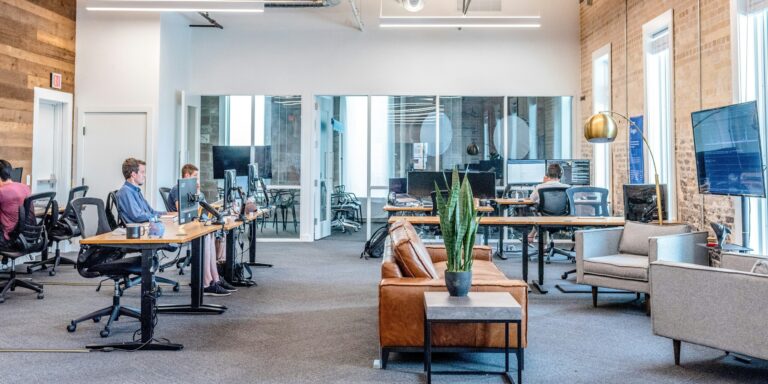As of June 6, 2025, the U.S. commercial real estate market is experiencing a notable transformation driven by the continued rise of hybrid and remote work models. In response to shifting workplace dynamics, businesses are reevaluating their office space needs, with many opting for more flexible, hybrid-friendly environments rather than committing to traditional, large office spaces. This shift is prompting landlords and commercial developers to adapt, and it’s changing the landscape of commercial properties in major cities across the country.
One of the most significant changes occurring in the commercial real estate sector is the increasing demand for spaces that facilitate hybrid work arrangements. The pandemic-induced remote work shift triggered widespread reevaluation of office space needs, and businesses have since discovered that a hybrid approach — where employees work both from home and in the office — offers flexibility and cost savings. As a result, many companies are downsizing their traditional office footprints in favor of adaptable, collaborative workspaces that can accommodate a mix of in-office and remote workers.
In response to these shifting demands, landlords and commercial developers are reinventing existing office properties to better align with the new expectations of tenants. Across major metropolitan areas like New York and San Francisco, outdated office buildings are being converted into mixed-use spaces that offer more than just a place to work. These revamped buildings are being designed with amenities such as co-working areas, fitness centers, and communal spaces that foster collaboration and support employee wellness. This transformation is not just about adding trendy perks; it’s about creating work environments that reflect the values and needs of today’s workforce, which places a premium on flexibility, community, and health.
The hybrid work model is not just a passing trend; it is expected to have a lasting impact on the commercial real estate market. Industry experts predict that as businesses continue to adopt hybrid or fully remote work policies, demand for traditional office spaces will remain weak, especially in urban cores. However, businesses that are still looking for physical office spaces will likely prioritize flexible, adaptable environments where employees can gather for meetings, brainstorming sessions, or team-building activities. These spaces are designed to be versatile, with open layouts and amenities that encourage interaction, collaboration, and a sense of belonging.
The trend toward hybrid workspaces is also reshaping the way commercial properties are marketed and managed. In many cases, commercial real estate developers are investing in technology and smart-building features to enhance the user experience. These can include contactless entry systems, high-speed internet connectivity, and advanced air filtration systems, all of which appeal to tenants who are increasingly concerned about health and safety. With employees divided between home and office, the emphasis is shifting from simply providing office space to creating environments that foster creativity, innovation, and employee well-being.
One of the driving factors behind this shift is the evolving expectations of workers. As employees demand greater flexibility in how and where they work, companies are increasingly looking for office spaces that cater to these needs. For some businesses, this might mean downsizing their office presence altogether, opting instead for smaller, more flexible offices that can be reconfigured based on changing needs. For others, it means creating dynamic spaces that are more conducive to collaboration, creativity, and innovation. For example, tech companies and startups are particularly keen on spaces that foster a sense of community, with shared workspaces and opportunities for social interaction.
While hybrid workspaces are gaining traction, the trend is not without its challenges. One of the biggest hurdles is the ongoing shift in the nature of commercial leases. Landlords are adjusting their leasing structures to accommodate shorter-term, flexible agreements, as businesses seek to avoid long-term commitments. This has led to a rise in demand for flexible office leasing models, such as co-working spaces or shared office arrangements, which offer businesses the ability to scale their office needs up or down as necessary.
Additionally, the transformation of office spaces into hybrid work environments is not limited to large cities. While cities like New York, San Francisco, and Los Angeles are seeing significant changes to their commercial real estate offerings, smaller cities and even suburban areas are also seeing a surge in demand for flexible, hybrid-friendly office spaces. Companies looking to expand or relocate are increasingly considering suburban office options that offer lower costs and a more relaxed atmosphere, while still providing easy access to urban centers when needed.
Looking ahead, it is clear that the hybrid work model is here to stay, and its influence on commercial real estate is likely to persist for the foreseeable future. As businesses continue to embrace flexible work arrangements, the demand for adaptable, collaborative workspaces will grow, while the demand for traditional, large office spaces may continue to decline. For developers and property managers, this means rethinking how they design, market, and lease office properties to meet the evolving needs of the modern workforce.
The future of commercial real estate will likely be defined by versatility and adaptability. As businesses continue to prioritize employee well-being and collaboration, developers will need to focus on creating spaces that not only accommodate changing work patterns but also support the broader goals of corporate culture and productivity. While the traditional office model may be fading, the hybrid workspace is emerging as the new standard for the modern workforce.
